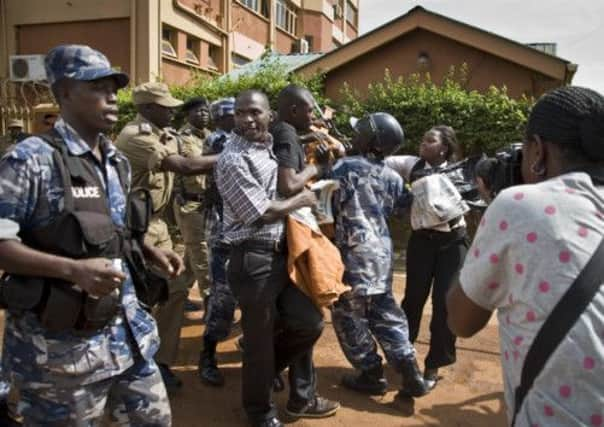Critics round on Uganda’s once great hope


Mr Museveni travels in a private jet paid for by taxpayers and recently added two Mercedes Benz limousines to his convoy. Some say he wants to rule for life, while others worry that Mr Museveni, in the style of some other African strongmen, is trying to groom his son as leader. That charge was given credence by the defection last month of an army general who urged an investigation into reports of an alleged plot for the son to succeed his father.
General David Sejusa, who is in London and faces arrest if he returns to Uganda, says he is fighting the use of state institutions such as the military to keep Mr Museveni in power. Gen Sejusa is a member of the army’s high command and a decorated hero of the bush war that brought Mr Museveni to power. His case has focused attention on the political evolution of a president who promised many years ago that his government would bring what he called “fundamental change” to Uganda.
Advertisement
Hide AdAdvertisement
Hide Ad“The problem of Africa in general and Uganda in particular,” Mr Museveni said in a speech in 1986, “is not the people but leaders who want to overstay in power.”
In What is Africa’s Problem? – a collection of Mr Museveni’s early speeches as president – he warns against official corruption, saying: “How can we hope to convince anyone of the rightness of our cause if our own people are violating our stated goals, thereby undermining our programme? Corruption is a problem which, if not checked, will hinder progress in all sectors of society.”
Mr Museveni said at the time that he despised African leaders who wasted taxpayer money on things like luxury cars and he urged public officials to “realise that social property is, in many ways, even more important than private property”.
In 1996, a year after the promulgation of Uganda’s constitution, the country held national elections widely praised as free and fair, boosting Mr Museveni’s growing reputation with Western donors as a reform-minded progressive leader.
However, some critics now say it is tough to imagine Museveni giving a passionate speech on corruption.
“I think Museveni’s determined to stay in power at all costs,” said Mwambutsya Ndebesa, a professor of political history at Uganda’s Makerere University. “He genuinely believes that he’s the only one with the vision to run this county. Is this project sustainable? My answer is no.”
Mr Museveni, who is in his late 60s, has now held power in Uganda for 27 years, making him one of Africa’s longest-serving leaders. In 2005, he had lawmakers remove term limits so could run again. He has won two elections marred by irregularities or violence since then.
Frank Tumwebaze, a government minister who speaks for the president, said Mr Museveni’s early criticism of long-serving leaders had been taken out of context by activists who fail to acknowledge that elections are held regularly in Uganda.
Advertisement
Hide AdAdvertisement
Hide Ad“For us as (the ruling party), we are convinced that if we front Museveni in 2016 he will give us better winning chances than any other person,” he said.
Mr Museveni, who was last re-elected in 2011, is praised by many here for presiding over a growing economy and restoring political stability after years of dictatorial rule. That view, however, is being disputed by some who say he has slowly transformed Uganda into a quasi-military state.
“Uganda has had militarism for quite a bit of time,” said Frederick Jjuuko, a law professor at Makerere. “But it is this regime that has perfected it.”